Project Management Report: Career Planning and Future Goals Analysis
VerifiedAdded on 2022/09/09
|5
|1113
|15
Report
AI Summary
This report provides an insightful overview of project management principles and their application to career planning. The author, a student, reflects on their understanding of project management, including the project life cycle (initiating, planning, executing, monitoring, and closing), and the necessary skills such as communication, planning, and tool implementation. The report details the student's career aspirations to become a project manager in the IT industry, outlining a 10-year plan. The student identifies relevant knowledge areas like integration, scope, time, cost, quality, and risk management, and discusses the potential challenges, such as risks related to certifications and internships, and the need for a backup plan. The report also highlights the importance of technical knowledge and team management skills in the field, demonstrating a clear understanding of the project management process and its relevance to career development.
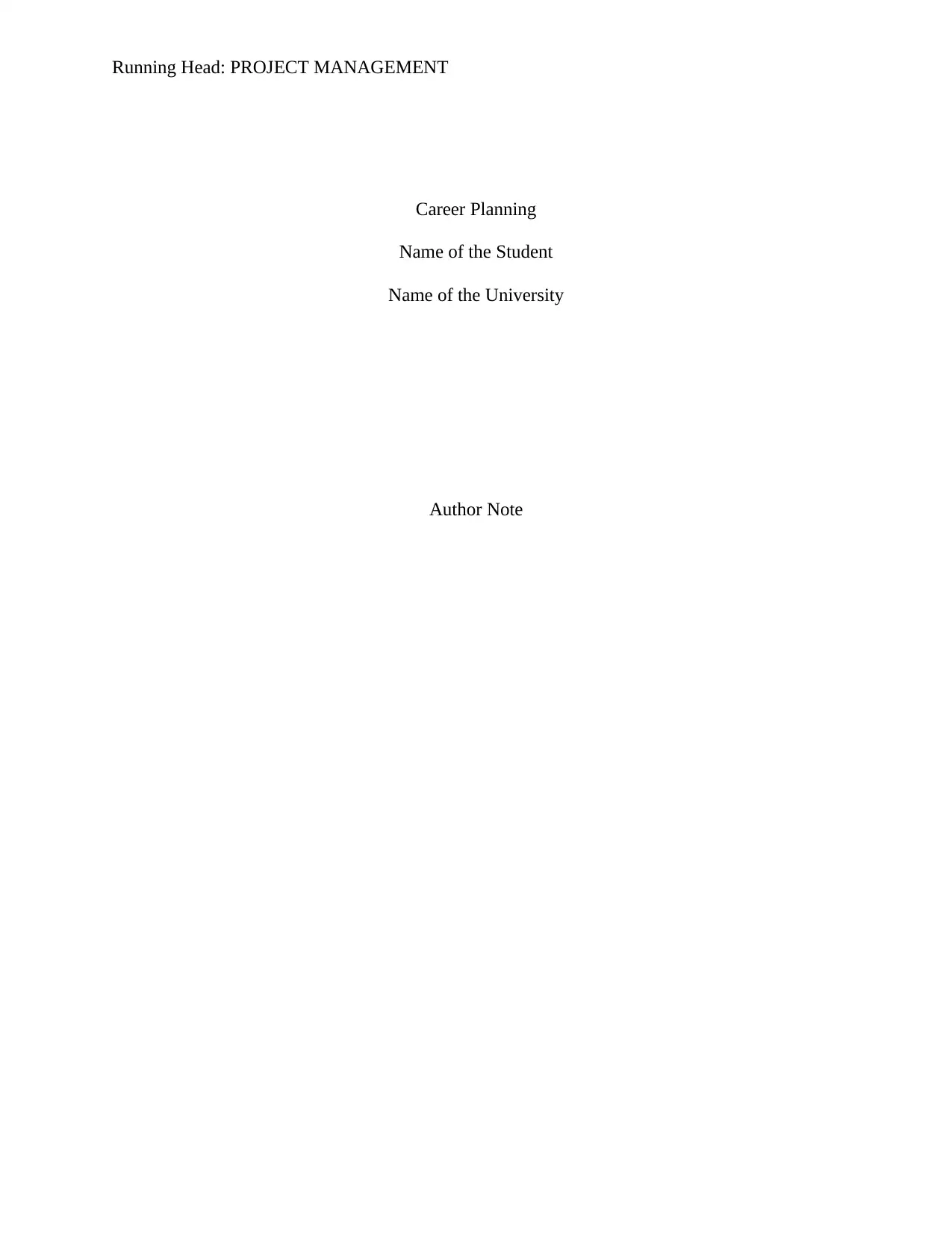
Running Head: PROJECT MANAGEMENT
Career Planning
Name of the Student
Name of the University
Author Note
Career Planning
Name of the Student
Name of the University
Author Note
Paraphrase This Document
Need a fresh take? Get an instant paraphrase of this document with our AI Paraphraser
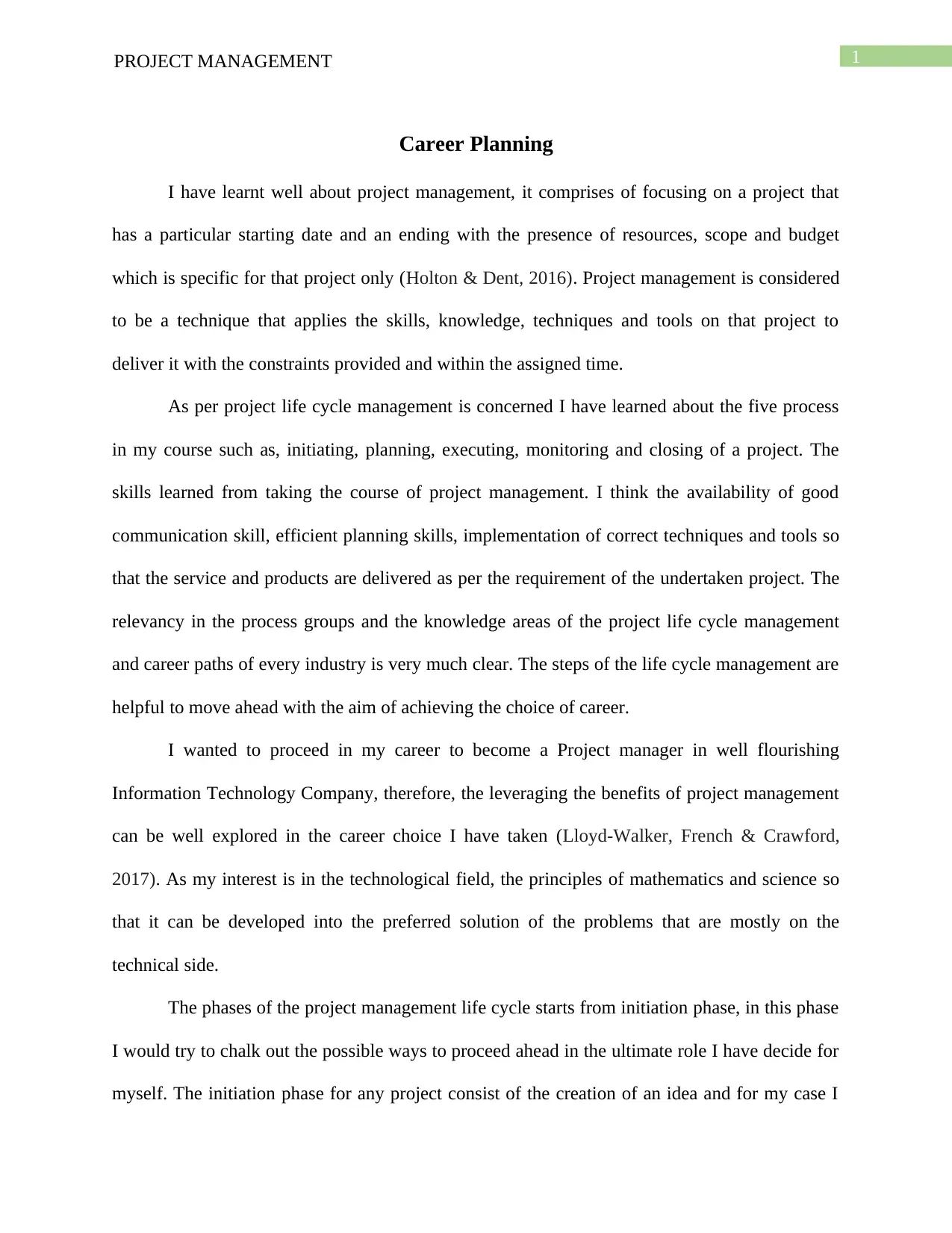
1PROJECT MANAGEMENT
Career Planning
I have learnt well about project management, it comprises of focusing on a project that
has a particular starting date and an ending with the presence of resources, scope and budget
which is specific for that project only (Holton & Dent, 2016). Project management is considered
to be a technique that applies the skills, knowledge, techniques and tools on that project to
deliver it with the constraints provided and within the assigned time.
As per project life cycle management is concerned I have learned about the five process
in my course such as, initiating, planning, executing, monitoring and closing of a project. The
skills learned from taking the course of project management. I think the availability of good
communication skill, efficient planning skills, implementation of correct techniques and tools so
that the service and products are delivered as per the requirement of the undertaken project. The
relevancy in the process groups and the knowledge areas of the project life cycle management
and career paths of every industry is very much clear. The steps of the life cycle management are
helpful to move ahead with the aim of achieving the choice of career.
I wanted to proceed in my career to become a Project manager in well flourishing
Information Technology Company, therefore, the leveraging the benefits of project management
can be well explored in the career choice I have taken (Lloyd-Walker, French & Crawford,
2017). As my interest is in the technological field, the principles of mathematics and science so
that it can be developed into the preferred solution of the problems that are mostly on the
technical side.
The phases of the project management life cycle starts from initiation phase, in this phase
I would try to chalk out the possible ways to proceed ahead in the ultimate role I have decide for
myself. The initiation phase for any project consist of the creation of an idea and for my case I
Career Planning
I have learnt well about project management, it comprises of focusing on a project that
has a particular starting date and an ending with the presence of resources, scope and budget
which is specific for that project only (Holton & Dent, 2016). Project management is considered
to be a technique that applies the skills, knowledge, techniques and tools on that project to
deliver it with the constraints provided and within the assigned time.
As per project life cycle management is concerned I have learned about the five process
in my course such as, initiating, planning, executing, monitoring and closing of a project. The
skills learned from taking the course of project management. I think the availability of good
communication skill, efficient planning skills, implementation of correct techniques and tools so
that the service and products are delivered as per the requirement of the undertaken project. The
relevancy in the process groups and the knowledge areas of the project life cycle management
and career paths of every industry is very much clear. The steps of the life cycle management are
helpful to move ahead with the aim of achieving the choice of career.
I wanted to proceed in my career to become a Project manager in well flourishing
Information Technology Company, therefore, the leveraging the benefits of project management
can be well explored in the career choice I have taken (Lloyd-Walker, French & Crawford,
2017). As my interest is in the technological field, the principles of mathematics and science so
that it can be developed into the preferred solution of the problems that are mostly on the
technical side.
The phases of the project management life cycle starts from initiation phase, in this phase
I would try to chalk out the possible ways to proceed ahead in the ultimate role I have decide for
myself. The initiation phase for any project consist of the creation of an idea and for my case I
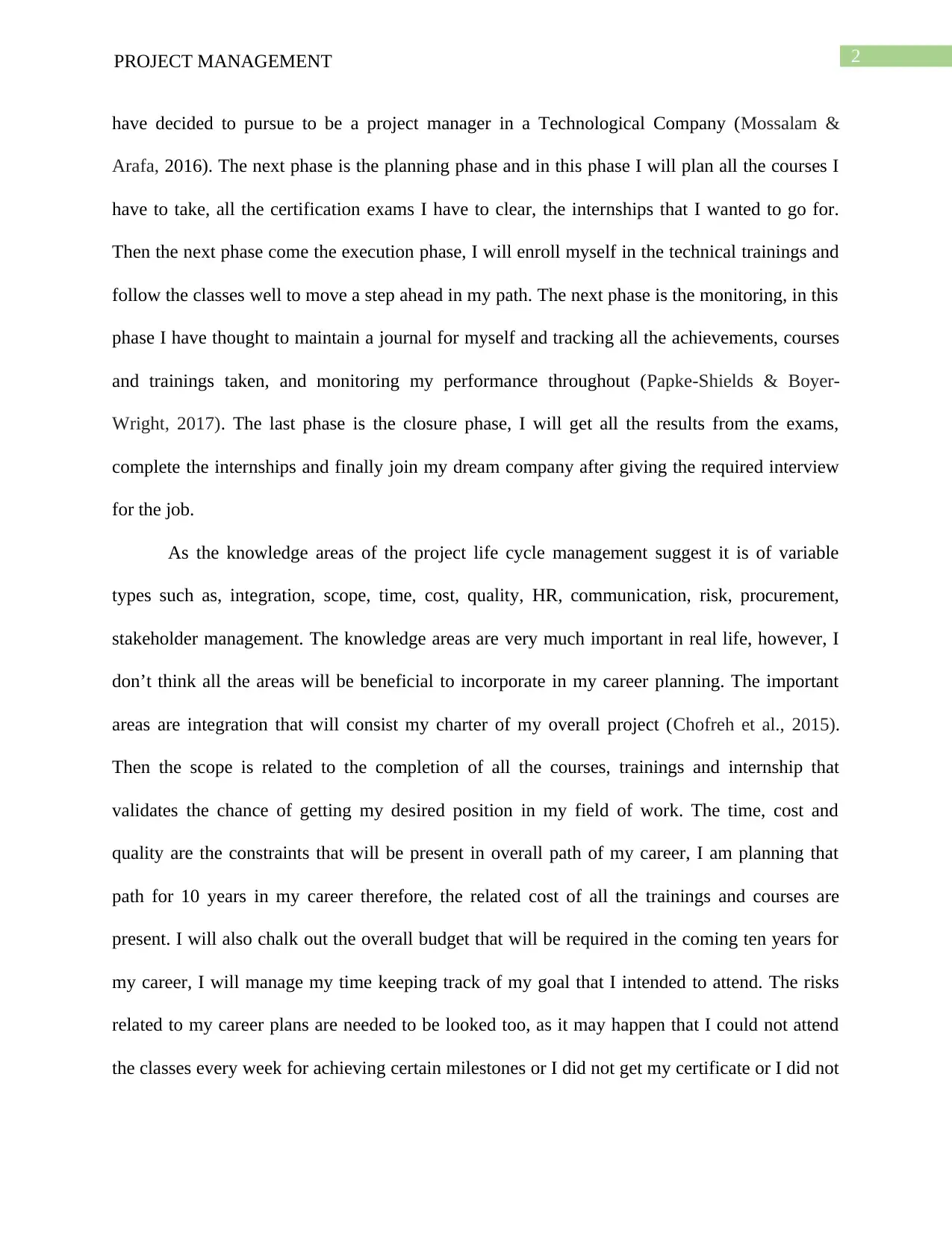
2PROJECT MANAGEMENT
have decided to pursue to be a project manager in a Technological Company (Mossalam &
Arafa, 2016). The next phase is the planning phase and in this phase I will plan all the courses I
have to take, all the certification exams I have to clear, the internships that I wanted to go for.
Then the next phase come the execution phase, I will enroll myself in the technical trainings and
follow the classes well to move a step ahead in my path. The next phase is the monitoring, in this
phase I have thought to maintain a journal for myself and tracking all the achievements, courses
and trainings taken, and monitoring my performance throughout (Papke-Shields & Boyer-
Wright, 2017). The last phase is the closure phase, I will get all the results from the exams,
complete the internships and finally join my dream company after giving the required interview
for the job.
As the knowledge areas of the project life cycle management suggest it is of variable
types such as, integration, scope, time, cost, quality, HR, communication, risk, procurement,
stakeholder management. The knowledge areas are very much important in real life, however, I
don’t think all the areas will be beneficial to incorporate in my career planning. The important
areas are integration that will consist my charter of my overall project (Chofreh et al., 2015).
Then the scope is related to the completion of all the courses, trainings and internship that
validates the chance of getting my desired position in my field of work. The time, cost and
quality are the constraints that will be present in overall path of my career, I am planning that
path for 10 years in my career therefore, the related cost of all the trainings and courses are
present. I will also chalk out the overall budget that will be required in the coming ten years for
my career, I will manage my time keeping track of my goal that I intended to attend. The risks
related to my career plans are needed to be looked too, as it may happen that I could not attend
the classes every week for achieving certain milestones or I did not get my certificate or I did not
have decided to pursue to be a project manager in a Technological Company (Mossalam &
Arafa, 2016). The next phase is the planning phase and in this phase I will plan all the courses I
have to take, all the certification exams I have to clear, the internships that I wanted to go for.
Then the next phase come the execution phase, I will enroll myself in the technical trainings and
follow the classes well to move a step ahead in my path. The next phase is the monitoring, in this
phase I have thought to maintain a journal for myself and tracking all the achievements, courses
and trainings taken, and monitoring my performance throughout (Papke-Shields & Boyer-
Wright, 2017). The last phase is the closure phase, I will get all the results from the exams,
complete the internships and finally join my dream company after giving the required interview
for the job.
As the knowledge areas of the project life cycle management suggest it is of variable
types such as, integration, scope, time, cost, quality, HR, communication, risk, procurement,
stakeholder management. The knowledge areas are very much important in real life, however, I
don’t think all the areas will be beneficial to incorporate in my career planning. The important
areas are integration that will consist my charter of my overall project (Chofreh et al., 2015).
Then the scope is related to the completion of all the courses, trainings and internship that
validates the chance of getting my desired position in my field of work. The time, cost and
quality are the constraints that will be present in overall path of my career, I am planning that
path for 10 years in my career therefore, the related cost of all the trainings and courses are
present. I will also chalk out the overall budget that will be required in the coming ten years for
my career, I will manage my time keeping track of my goal that I intended to attend. The risks
related to my career plans are needed to be looked too, as it may happen that I could not attend
the classes every week for achieving certain milestones or I did not get my certificate or I did not
⊘ This is a preview!⊘
Do you want full access?
Subscribe today to unlock all pages.

Trusted by 1+ million students worldwide
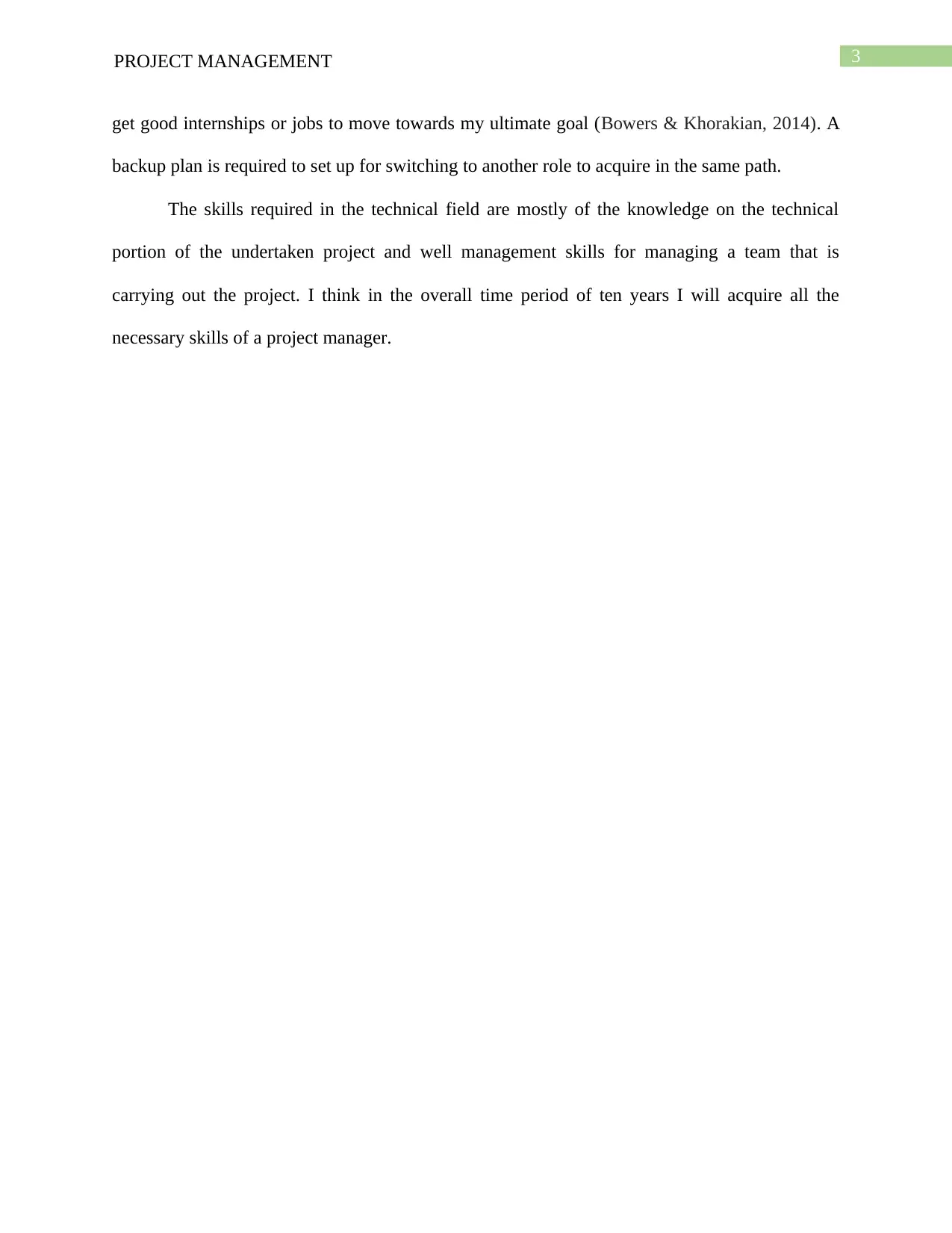
3PROJECT MANAGEMENT
get good internships or jobs to move towards my ultimate goal (Bowers & Khorakian, 2014). A
backup plan is required to set up for switching to another role to acquire in the same path.
The skills required in the technical field are mostly of the knowledge on the technical
portion of the undertaken project and well management skills for managing a team that is
carrying out the project. I think in the overall time period of ten years I will acquire all the
necessary skills of a project manager.
get good internships or jobs to move towards my ultimate goal (Bowers & Khorakian, 2014). A
backup plan is required to set up for switching to another role to acquire in the same path.
The skills required in the technical field are mostly of the knowledge on the technical
portion of the undertaken project and well management skills for managing a team that is
carrying out the project. I think in the overall time period of ten years I will acquire all the
necessary skills of a project manager.
Paraphrase This Document
Need a fresh take? Get an instant paraphrase of this document with our AI Paraphraser
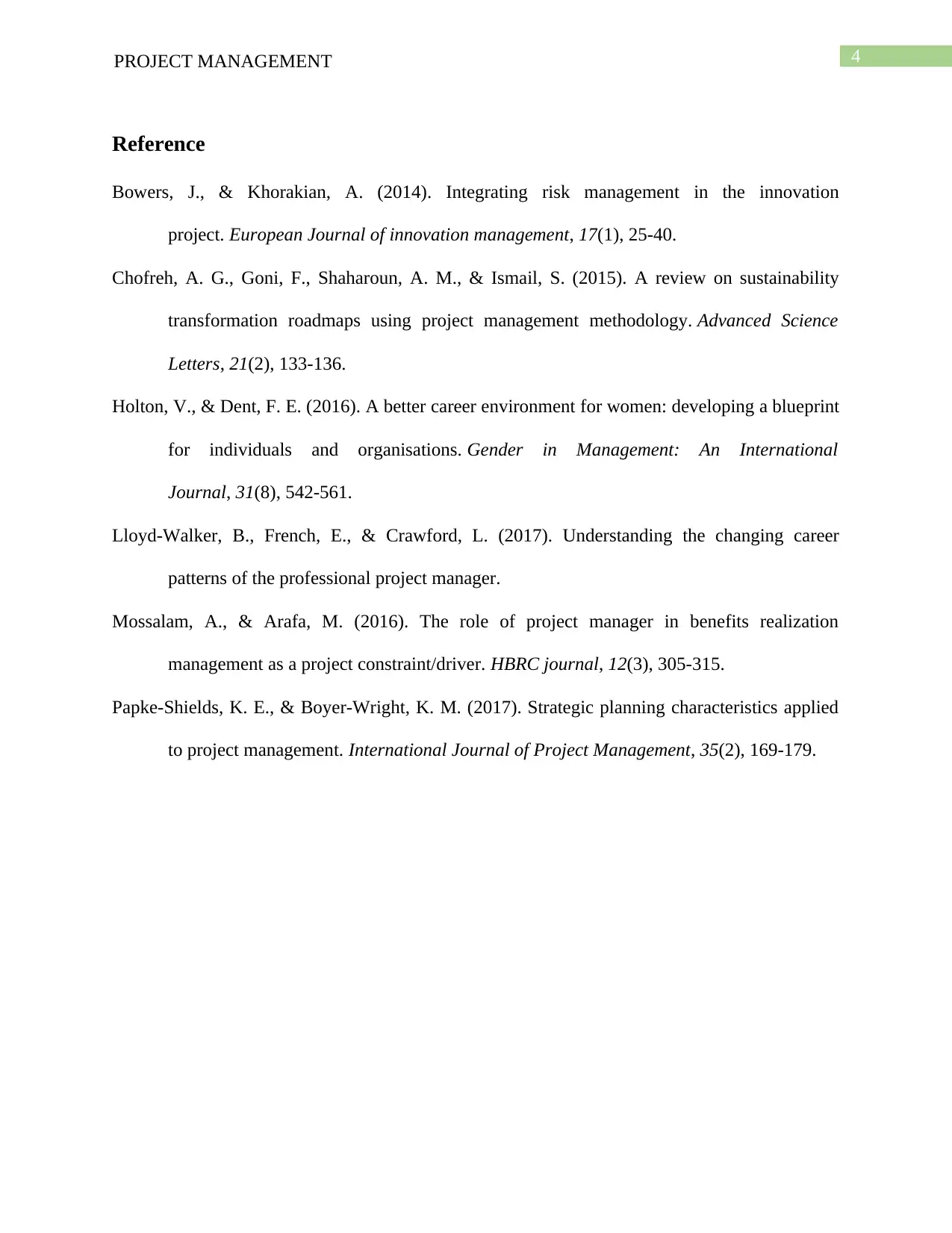
4PROJECT MANAGEMENT
Reference
Bowers, J., & Khorakian, A. (2014). Integrating risk management in the innovation
project. European Journal of innovation management, 17(1), 25-40.
Chofreh, A. G., Goni, F., Shaharoun, A. M., & Ismail, S. (2015). A review on sustainability
transformation roadmaps using project management methodology. Advanced Science
Letters, 21(2), 133-136.
Holton, V., & Dent, F. E. (2016). A better career environment for women: developing a blueprint
for individuals and organisations. Gender in Management: An International
Journal, 31(8), 542-561.
Lloyd-Walker, B., French, E., & Crawford, L. (2017). Understanding the changing career
patterns of the professional project manager.
Mossalam, A., & Arafa, M. (2016). The role of project manager in benefits realization
management as a project constraint/driver. HBRC journal, 12(3), 305-315.
Papke-Shields, K. E., & Boyer-Wright, K. M. (2017). Strategic planning characteristics applied
to project management. International Journal of Project Management, 35(2), 169-179.
Reference
Bowers, J., & Khorakian, A. (2014). Integrating risk management in the innovation
project. European Journal of innovation management, 17(1), 25-40.
Chofreh, A. G., Goni, F., Shaharoun, A. M., & Ismail, S. (2015). A review on sustainability
transformation roadmaps using project management methodology. Advanced Science
Letters, 21(2), 133-136.
Holton, V., & Dent, F. E. (2016). A better career environment for women: developing a blueprint
for individuals and organisations. Gender in Management: An International
Journal, 31(8), 542-561.
Lloyd-Walker, B., French, E., & Crawford, L. (2017). Understanding the changing career
patterns of the professional project manager.
Mossalam, A., & Arafa, M. (2016). The role of project manager in benefits realization
management as a project constraint/driver. HBRC journal, 12(3), 305-315.
Papke-Shields, K. E., & Boyer-Wright, K. M. (2017). Strategic planning characteristics applied
to project management. International Journal of Project Management, 35(2), 169-179.
1 out of 5
Related Documents
Your All-in-One AI-Powered Toolkit for Academic Success.
+13062052269
info@desklib.com
Available 24*7 on WhatsApp / Email
![[object Object]](/_next/static/media/star-bottom.7253800d.svg)
Unlock your academic potential
Copyright © 2020–2026 A2Z Services. All Rights Reserved. Developed and managed by ZUCOL.





